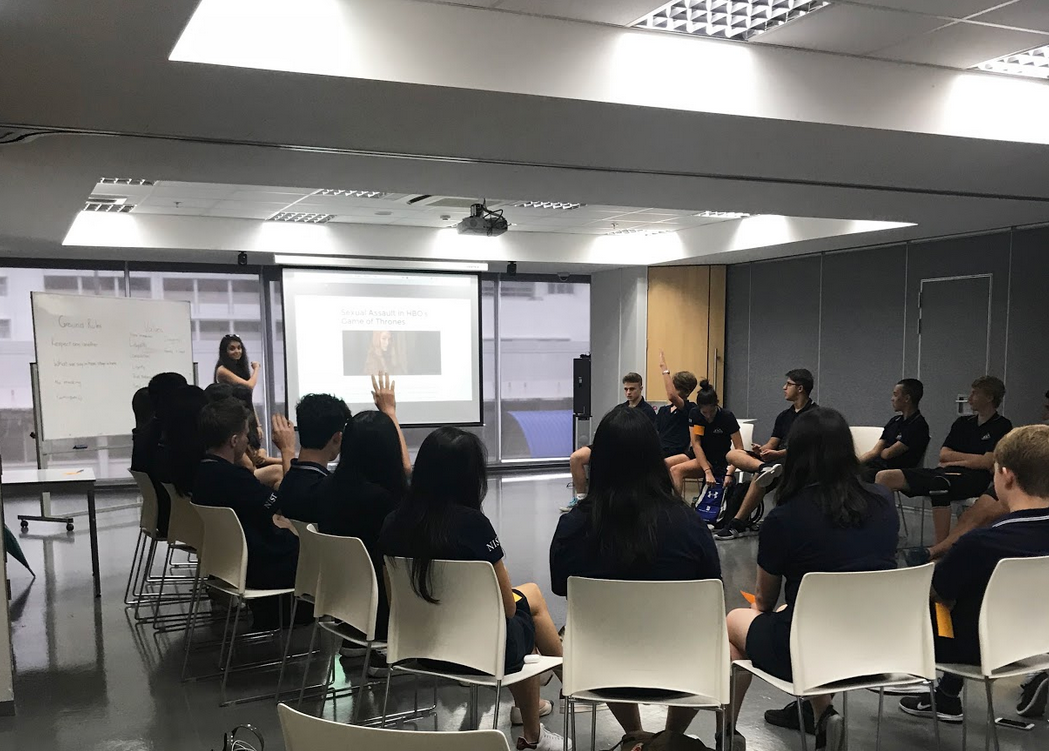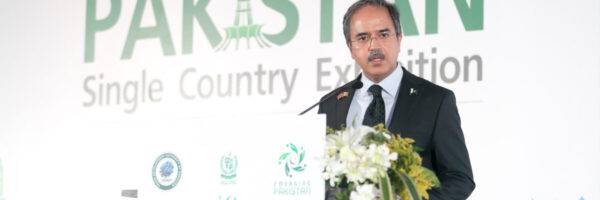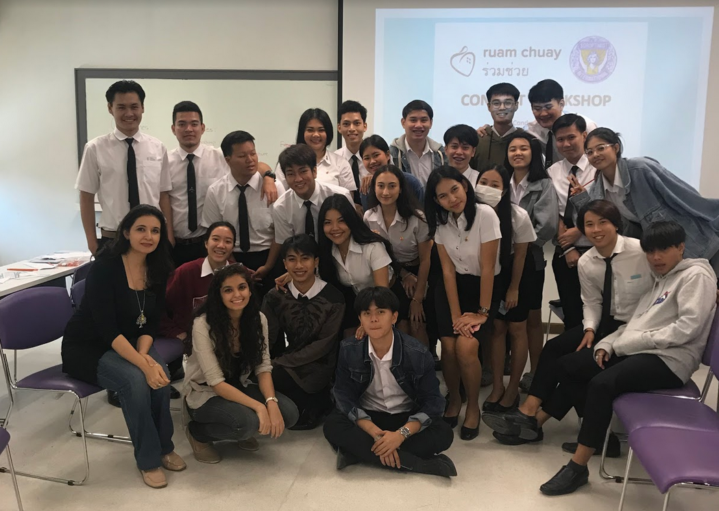
Filling in gaps in sexuality education and preventing sexual assault
Beyond the mechanics, we need to explore the interpersonal and emotional dynamics within intimate relationships in sexuality education.
Breaking the silence
Sitting at the dining table one summer night in 2013, I blurted out to my mom:
“Mama, you and Papa never gave me the talk!” I was referring to the conversation about safer sex famously known in pop culture as “the talk”. Not exactly your typical parent-child dinner table discussion topic. Especially in Thailand.
But it was on my mind because, just before returning home from my fourth semester at the University of Southern California, I had done some training on the issue of sexual violence. A hot button topic on college campuses in the United States that year (this still remains true today—all over the world). Growing up in Thailand, one of the more interesting things I had to adapt to when going to college abroad was open conversations about sex. Both about sexual health, and sexual assault. It was a little bit of culture shock that I didn’t expect to have.
Turns out, at the same time I was getting my education on the subject, my mom had been researching it too. She had just been appointed to lead the End Gender-Based Violence Committee at a philanthropist organisation, Soroptimist International Bangkok. She oversaw initiatives designed to eliminate sexual violence. Fast forward 5 years later—armed with more training, tools to share, and a handful of successful pilot workshops under our belt—together we launched Ruam Chuay, a non-profit organisation. Our purpose? To equip our community with the vocabulary and tools to have healthy interpersonal relationships, with a specific focus on addressing interpersonal violence. We do this by hosting facilitated workshops, talks, and discussions at schools and organisation.
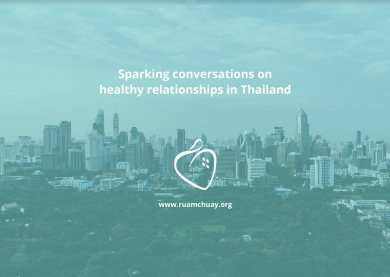
Confronting difficult truths
That summer night, my mom and I opened up a long overdue conversation. We reflected on how I learned about sex, what was covered in sex education, and what we felt could have been done differently. We also chatted about my training in emergency response and paraprofessional counselling for young adults. And how, unfortunately, due to this work, I know many people who have experienced some form of sexual assault—in Thailand and abroad.
Many of these people were my peers. This, sadly, isn’t unusual given what we know about sexual violence. That is, that people between the ages of 12 to 34 are most likely to experience some form of sexual assault. (1) And, that 9 out of 10 times the person who experiences some form of assault is harmed by someone they know. (2) Which often meant, while I was in high school and university, I knew both the person who was assaulted and the person who committed the wrongdoing. Navigating these relationship dynamics are tricky. Given the prevalence of this type of violence, I knew I wasn’t alone in this position.
By definition, interpersonal violence is violence that occurs between people within the same community (for example, a school, workplace, or family). When this takes place, it not only affects the individuals directly involved but also disrupts the wellbeing of, and sense of safety within the wider community. So, how do we begin to address such a complex, multi-layered issue? By having safer conversations about it.
Designing spaces for safer conversations on interpersonal violence
Culturally, the stigma attached to discussing sex-related topics, whether that be sexual health or sexual violence, holds us back from being able to prevent harmful situations from taking place. It also hinders our ability to respond effectively when something does happen. Fortunately, over the past two years, we’ve started to see a shift in this area. Sexual assault has caught the attention of news media both locally and internationally. In part due to viral social media movements along with heavily publicised harassment cases and scandals—we’re starting to talk more openly about this problem as a society.
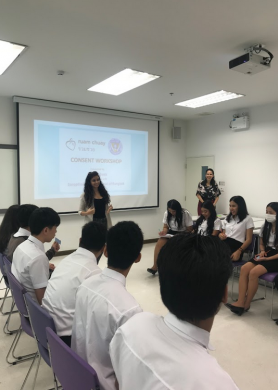
This has been such a welcome change from the silence. Having said that, watching some of this public conversation unfold with a trained eye has been concerning. Why? Among a mix of empowering conversations, there has also been a fair share of blame, shame, fear, frustration, and confusion to go around. Talking about sexual violence often becomes polarising (at times it is even politicised). This makes it hard to address the issue productively. Ultimately, these conversations don’t just need to happen. They need to happen safely. With the recognition of the social and cultural norms at play. And especially, with consideration of the traumatic nature of sexual violence.*
While developing Ruam Chuay, we learned that of the six areas required in sexuality education, the two areas with inconsistent and little to no coverage across schools in Thailand are sexual rights and violence. (3) Our workshops are designed to fill this gap and address the interpersonal and emotional aspects of intimate relationships. In our workshops, we facilitate safe and solution-oriented conversations. We create clarity around sexual assault and explore specific ways each of us play a part in preventing it. Equipping students with skills they can use in their daily lives to have safer relationships (in all contexts, not just sexual).
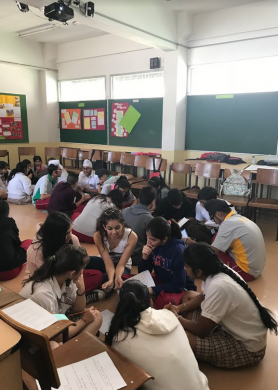
Since we launched in August 2018, we’ve had over 300 students go through our programme. It’s been such a joy to see high school and university students engage in nuanced discussions on this challenging subject. The most encouraging part? In our programme data, we’ve found that 98.7% of students leave our workshops agreeing that these topics are important for their community to learn about.
Even in a culture that traditionally hasn’t talked openly about sexual rights and violence; these experiences have shown me that open conversations, when done right, can bring about positive change and help create safer communities. Just like how one dining table conversation between mother and daughter planted the seed that eventually grew into a non-profit organisation.
If you’d like to spark a conversation on healthy relationships by bringing a workshop or talk to your school contact us directly at [email protected]. To learn more or join our community of advocates, sign up for our newsletter at: www.ruamchuay.org/community
(1) RAINN. Victims of Sexual Violence: Statistics.
(2) Adams, Lucy. (March 2018). Sex attack victims usually know attacker, says new study. BBC News.
(3) Ministry of Education and UNICEF. (2016). Review of Comprehensive Sexuality Education in
Thailand.
*Ruam Chuay uses a trauma-informed approach within our organisation and programmes. A trauma-informed approach is one helps us promote safety, healing, and wellbeing for the participants.
About Ruam Chuay
Ruam Chuay contributes to creating a safer world by preventing interpersonal violence. Our primary programs are designed to prevent sexual assault and fill in gaps in sexuality education at schools. We cover topics such as consent, personal boundaries, bystander intervention, and trauma.
Highlights
- Launched in August 2018
- Delivered 14 violence prevention and education workshops across 4 schools in Bangkok
- Worked with 320+ students in small groups settings
- Hosts regular restorative justice circles with community members, parents, and students to break the silence on sexual health and sexual violence.
Website: www.ruamchuay.org Instagram: @ruam.chuay Facebook: www.facebook.com/ruamchuay
